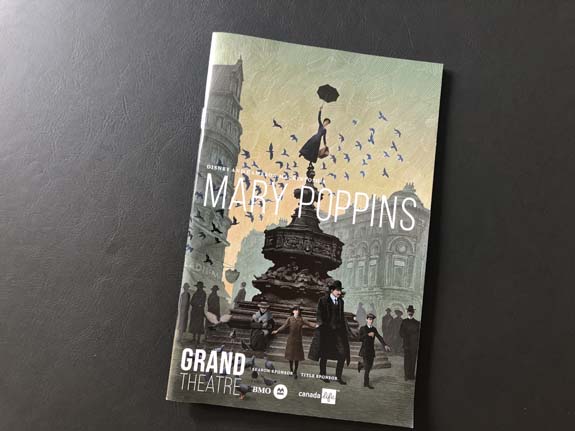
Mary Poppins at The Grand Theatre
Megan Watson’s exuberant and imaginative production of Mary Poppins at the Grand Theatre in London will enthrall young children. Adults may wish to quibble.
The musical Mary Poppins is a bit of a Frankenstein monster, cobbled together from the children’s series by P.L. Travers and (mostly) the Walt Disney film of 1964, with unspecified contributions from London impressario Cameron Mackintosh and songs from the Sherman Brothers (the film) and George Stiles and Anthony Drewe (the original London production), with a book by Julian Fellowes of Downton Abbey fame. All these cooks haven’t so much spoiled the broth as made it somewhat lumpy. It’s not until the second act that the heart of the show emerges.
For folks who don’t know (can there be any?), Mary Poppins (Deborah Hay) is an enchanted Edwardian-era nanny who mysteriously appears to assist families that are “upside down.” In this case, it’s the Banks family of Cherry Tree Lane, whose unruly children, Jane (Abi Verhaeghe) and Michael (Hayden Baertsoen), have driven a succession of nannies to despair and new employment. Their parents, George (Ben Carlson) and Winifred (Alexis Gordon) are not so much evil as distracted. George is trying to be the model of a modern major capitalist, while Winifred, an ex-actress we learn, is trying to live up to what she imagines as the ideal of a proper wife, which means abdicating much of her motherly role to the nanny.
While Mary takes the kids in tow and introduces them to Bert (Mark Uhre) a cockney jack-of-all-trades, we visit George at the bank where he works and see him turn down a loan to a German flim-flam artist, while giving one to an earnest young man who wants to open a factory that will benefit his employees (hey, it’s a musical). When the head of the bank learns that the bank’s major competitor has bankrolled the German, George is put on unpaid leave while the board decides his fate. Will the Banks family face disgrace and penury?
Meanwhile, Mary Poppins takes one of her periodic breathers and Winifred, hoping to assuage her husband’s desire for “precision and order,” tracks down and hires George’s former nanny, Miss Andrew (the brilliant Jan Alexandra Smith). When George meets her, he flees in abject terror and Mary Poppins returns to send her packing.
Finally, George is summoned to the bank to learn his fate and, yes, there is a happy ending, one that emphasizes the importance of work-life balance for a healthy family and makes a sort of feminism-lite nod to Winifred’s new-found agency.
More Reviews
To access the complete archive of reviews listed alphabetically CLICK HERE.
Director Watson has set the piece in a large, plain box (set design by Lorenzo Savoini) that is somewhat reminiscent of Peter Brooks’ legendary set for Midsummer Night’s Dream. What renders it anything but plain are the exuberant projections of Jamie Nesbitt that transform the space into a child’s bedroom, a London park, and most memorably the rooftops of a very polluted London.
What most people will remember from the movie are the songs, and songs mean dance numbers. So the lackluster choreography of Stephen Cota comes as a profound disappointment. The lack of pizzazz is surprising considering that Cota served as associate choreographer to Donna Feore in seven productions at the Stratford Festival. Most tragically, he has failed to mine Mark Uhre’s prodigious talents as what used to be called an “eccentric dancer.” True, he has Uhre fly during the chimney sweeps number, but it’s hardly a substitute for the rubber-limbed panache that made Uhre such a scene stealer in Feore’s production of Guys and Dolls.
What elevates this production to must-see status is the superb cast, most of them veterans of the Stratford and Shaw Festivals. Under Watson’s guidance they give performances that delve deeply into their characters’ reality. Ben Carlson as George brings gravitas and genuine feeling to a character that could easily have been a cardboard cutout, and Alexis Gordon, in addition to contributing her silvery singing voice, makes Winifred’s love for her family palpable. Mark Uhre, who narrates the action in the persona of Bert, is charming when he’s not singing and dancing and, when he is, even the simple steps he has been given burst with life. In her brief appearance as the gorgon, Miss Andrew (she also doubles as the Bird Woman), Jan Alexandra Smith makes an indelible impression. Watson has also elicited assured performances from the two kids.
Deborah Hay, of course, is a national treasure. Her Mary Poppins doesn’t break new ground but wisely hews close to the model we all remember from the film, although she adds an endearing touch of melancholy when, her job done, she takes leave of the Banks children. Umbrella held high, she flies with the casual aplomb of a fearless teenager. Flying by Foy gets credit for the aerial work.
Dana Osborne has provided period appropriate costumes, the only false note being the outfit worn by the Banks’ manservant; presumably this choice was made to facilitate the actor’s doubling in a variety of other, silent roles, but it will strike a discordant note for those who have seen any of the gazillion shows about the Edwardians.
The show is miked, of course, as even the most intimate of musicals in the most intimate of spaces are these days. My wife, who felt physically assaulted by the volume, opined that sound designer Brian Kenny must have borrowed the sound system from Theatre for the Dead. Those who have not destroyed their hearing with years of rock concerts may want to pack earplugs.
Mary Poppins continues at the Grand Theatre through December 29, 2019.
The Grand Theatre
471 Richmond Street
London, ON
519-672-8800

